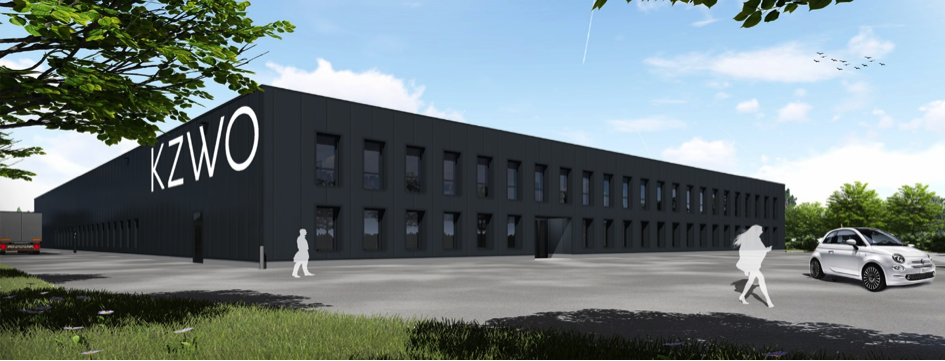KZWO 4.0
New construction saves 25 percent energy costs
KZWO GmbH has set itself the goal of building up a modern, highly digitized production plant for upholstery elements, furniture and textile equipment from classic upholstery. The essential task in the next few years is to rebuild the development and manufacturing process of the products so that modern machines such. B. CNC fabric, wood and foam cutter used in production.
For this reason KZWO realizes the new building of a company headquarters in the industrial park Rhön in Eichenzell. From 2019, a modern, automated production site will be combined with an innovative, environmentally friendly administration wing.
CO2 footprint is reduced by 23 percent
Managing Director Mathias Leilich already thought of energy efficiency when he first considered the new building. Geothermal energy and photovoltaics should make the company less dependent on fossil fuels. In addition, the production processes urgently needed to be optimized and digitized. Ideally, KZWO GmbH also wanted to apply for funding for both projects. On the advice of RKW Hessen, Mathias Leilich took advantage of a PIUS consultation, which Marcus Nickel of the energy office B-E-E-E took over. PIUS stands for Production Integrated Environmental Protection and is a grant program that subsidizes both consulting and investment grants as well as low cost loans. From Hessen PIUS the advice was partly financed first. Marcus Nickel analyzed the operation as a whole and found that the company’s old production caused a far too large carbon footprint – around 3,639 tonnes a year. He calculated in his report, which later also formed the basis for the grant applications, the potential savings. Overall, KZWO GmbH will save around 836 tons of CO2 or 23 percent with digitization and new construction. The company achieves the majority of this through digitization measures in production.
Digital production reduces waste and scrap by up to 20 percent
The KZWO GmbH realizes sophisticated interior equipment for yachts, cruise liners and leading caravan manufacturers. Today, the Fulda-based manufactory operates a fabric and foam blank, a sewing shop and a wood workshop in addition to the prototype workshop. This is where ready-for-production end products for a subsequent single or large series production are produced. A major challenge at the beginning was the outdated machinery and the antiquated work processes. As a result, the managing directors successively led to the digitization of all production documents and workflows. The first step was a CAD software and a connected fabric cutting machine. This combination reduced the blend of expensive luxury fabrics by twelve percent. Digitalization will soon reduce waste in the wood workshop by 10% with new networked CNC machines and by more than 30% in foam cutting. These measures alone reduce CO2 emissions by more than 736 tonnes per year. “The digitalization of the production was worthwhile after a short time”, reports Mathias Leilich. Due to the strong order growth, he was able to hire the necessary specialists without terminating the previous employees. Meanwhile, even the sewing machines are networked via a PDM (Production Data Management). The specialists in the sewing workshop obtain cutting and sewing plans from the PDM, which simultaneously records the time required. All production data then flows into the Enterprise Resource Planning System (ERP). Even though not all areas are integrated, CAD, PDM and ERP today form a seamlessly digitally networked workflow. This saves the company costs, reduces the use of resources and makes production much more flexible. “We can react much faster to customer requests,” explains Mathias Leilich the advantages. “Previously, when we had to communicate a change in all departments, this is done via mouse click directly into the production via the PDM.” However, thanks to its growth, this is bursting at the seams. A new building has to be built that turns the digital enterprise into the top player of its fallow land with its new machinery and energy consumption.
New building with air heat pump, photovoltaic and e-gas station
With the new building in the Rhön Industrial Park in Eichenzell, KZWO GmbH is now laying the foundations for further growth. The property itself finances the company through its house bank. For the energy investments, Mathias Leilich as well as for the new production facilities received funding from the Hessen-owned WI-Bank and PIUS Invest. Unlike originally planned, could not realize a supply of geothermal energy because of a nearby drinking water protection area. Now an air heat pump with gas boiler will provide heat. The photovoltaic system on the roof will in future take on up to 35 percent of the total electricity requirement. She also feeds a charging station for the forklift truck. The entire building will receive LED luminaires with presence detectors that consume up to 80 percent less electricity than conventional light sources. The move is scheduled for December 2018.
Mathias Leilich explains his motives for using modern energy efficiency technology: “As a company, we also have a mandate to face the demands of the environment and climate change. We can not expect future generations to live with scarce resources. So I am grateful that we can reduce our carbon footprint faster with our investment grants.”
30 percent subsidy for digitization and energy efficiency
From PIUS Invest alone, KZWO GmbH receives 30 percent of the Investment as a non-repayable subsidy for the digitization of production, the photovoltaic system and the electricity charging station. With an innovation loan, WI-Bank finances 70 percent of these costs. The construction costs are partly financed by KfW and WI-Bank with low-interest loans.
“Alone KZWO GmbH would not have received this sum on the capital market. But thanks to the pledges of WI-Bank, KfW and PIUS Invest, we were able to establish a solid mix financing. This ensures our company further growth, maintains and creates jobs. Above all, however, we will be producing a sensible use of resources in the future, “summarizes Mathias Leilich.
For more information, see www.efre.hessen.de
